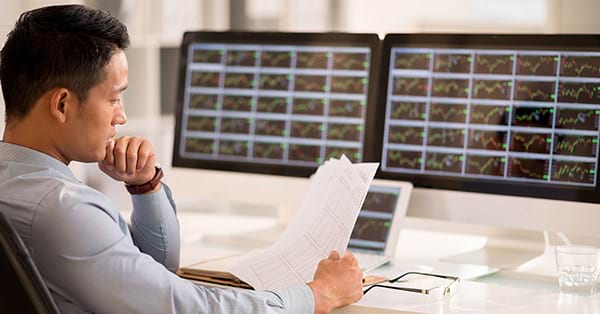Please note: This article is accurate at the time of publication (stated below). But with the situation around coronavirus changing frequently, you may not see the most up-to-date information in the text below. To receive the latest updates around COVID-19, please visit the World Health Organization’s website.
Has all the talk around coronavirus or COVID-19 got you worried? On top of becoming a serious global health issue and causing travel problems across the world, it's also been linked to market volatility. But what does that mean for you as an investor? Here's a quick breakdown.
What's market volatility?
Market volatility refers to the unpredictability - the rise and fall or ups and downs - of the stock market. In this case, the stock market recently plunged. Why? Some investors have attributed it to the rising fears about the coronavirus and it's potential effect on the global economy.
After the World Health Organization (WHO) mentioned the possibility of a coronavirus pandemic, equities fell. The deep selloff in equity markets and mounting economic fears have also raised expectations that central banks could lower interest rates to support growth.
Coronavirus (COVID19): How to stay healthy and protect yourself
Will coronavirus (COVID-19) lead to a global recession?
To answer this simply: No one knows for sure.
There's still a lot we don't know about this coronavirus. Because of it's unique nature, it's difficult to predict what the economic impact of COVID-19 will be and how the market will react. Keep in mind, it's also hard to separate one thing, like a virus, from everything else that can affect or hurt markets and economies.
According to Sun Life's Chief Investment Officer, Randy Brown, the stock market may recover quickly, but the disruption to supply chains could last longer. This, in turn, may create more difficulties for the global economy, just as it was recovering from the U.S.-China trade spat.
"Most economists expect China to take a 0.3-1.5% hit to its annual GDP from the impact of coronavirus," Brown wrote in a recent Forbes blog post. "Travel restrictions and the need to minimize contact will impact services. Manufacturing plants will see a productivity loss as infected workers, quarantines and transportation delays disrupt output." This means the expected economic rebound from the U.S.-China Phase I trade deal may be delayed.
How do you deal with uncertainties as an investor?
It's normal for markets to go up and down. And, if your reason for saving or financial situation hasn't changed, it's generally better to stay the course to meet your goals.
When it comes to your savings, it's important to:
- Have a plan
Know your tolerance for risk and then build your investment portfolio with that in mind. If you can’t stomach volatility, don’t buy volatile investments. But remember that meeting your investment goals sometimes means taking on some risk. And, taking on some risk means knowing there will be volatility in investment returns.
Short-term market fluctuations can cause even the most experienced investor to panic. But it's important to focus on your long-term investment goals and stick to a disciplined plan to avoid making moves that may come form an emotional reaction to drops in the market.
- Try to have a balanced investment portfolio
It’s all about balance. Investors tend to let recent experiences affect their decisions. For example, if the value of your portfolio recently went down, then you may be scared of seeing it go down further. Investing in less volatile investments with lower standard deviations* such as balanced funds might make it easier for you to resist the temptation to sell if markets change.
(*The standard deviation is a measure of volatility. So the more a stock's returns fluctuate from the stock's average return, the more volatile the stock.)
Remember that market volatility means that the markets will sometimes go down, but they often bounce back. Having a balanced portfolio and staying the course during periods of uncertainty may help you in the long run.
- Consider getting professional advice
Working with an advisor can help you build an investment portfolio that meets your long-term goals and aligns with your tolerance for risk.
An advisor can also help you avoid making emotionally-driven decisions. You can't avoid volatility and risk, but you can manage their impact on your investments.
Talk to your Sun Life Advisor now
March 04, 2020, How does coronavirus (COVID-19) affect your savings? [Web page]. Retrieved from Canada Sun Life Corporate Website read the article
Information provided above is for reference only, please refer to the Conditions of Use of the site .






